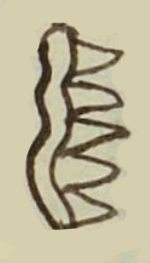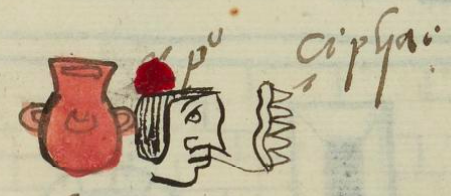Cipac (MH769v)
This black-line drawing of the simplex glyph for the personal name Cipac ("Crocodile") is attested here as a man's name. The sign shows an upright wavy object with five triangular obsidian points on their sides, pointing toward the viewer's right. These points seem attached to the wavy object. The image does not resemble an object, but it seems to connect the rough exterior of a crocodile with obsidian points.
Stephanie Wood
Does this stylized glyph convey a cosmic perception? The cosmic perceptions of reptiles by Nahuas of the Sierra Norte of Puebla enter into a free, online study by Pierre Beaucage (et al), "Les reptiles dans les savoirs et l’imaginaire des Nahuas/Maseualmej de la Sierra Norte de Puebla (Mexique)," Recherches amérindiennes au Québec 49:3 (December 2020):17-28.
Cipactli is a day name in the religious divinatory calendar of 260 days, the tonalpohualli. Perhaps this stylized version is meant to disguise that the family who named their baby this were still consulting the calendar, a practice that some friars had hoped to root out. Alternatively, because the crocodile was a double for a the divine force or deity, Tonacatecuhtli, creator of the universe and the human race, this glyph could represent that divine force instead of the crocodile. See Anastasia Kalyuta's article in Mexicolore.
po çiphac
Pedro Cipac
Stephanie Wood
1560
Jeff Haskett-Wood
cocodrilos, caimanes, cocodrilo, caiman, crocodiles, cipactli, dragones, cuchillos, fechas, nombres de dias, calendarios, nombres de hombres

cipac(tli), crocodile, caiman, https://nahuatl.wired-humanities.org/content/cipactli
Cocodrilo
Stephanie Wood
Matrícula de Huexotzinco, folio 769v, World Digital Library, https://www.loc.gov/resource/gdcwdl.wdl_15282/?sp=613&st=image
This manuscript is hosted by the Library of Congress and the World Digital Library; used here with the Creative Commons, “Attribution-NonCommercial-ShareAlike 3.0 License” (CC-BY-NC-SAq 3.0).






